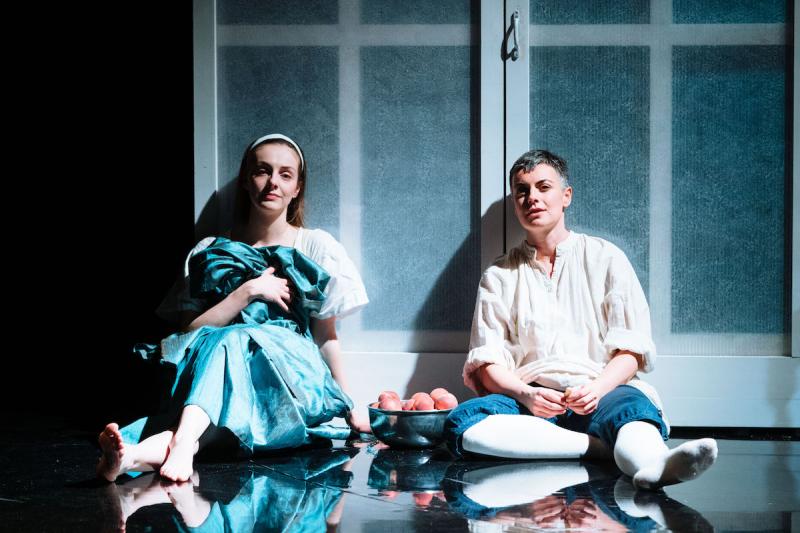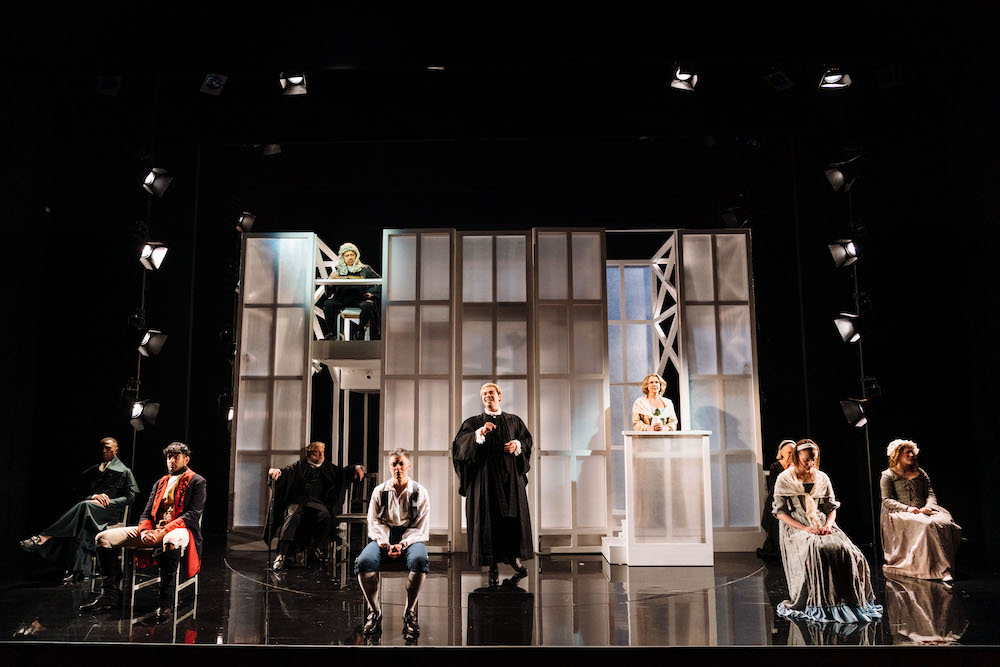Linck & Mülhahn, Hampstead Theatre review - problems as well as pleasures | reviews, news & interviews
Linck & Mülhahn, Hampstead Theatre review - problems as well as pleasures
Linck & Mülhahn, Hampstead Theatre review - problems as well as pleasures
Ruby Thomas's new play about a gender-pioneering couple is provocative and engaging

With the total loss of its Arts Council funding, Hampstead Theatre’s future as a specialist new writing venue is in doubt. But before anything drastically changes, the playwrights and plays developed by Roxanna Silbert, who was edged out as artistic director in December last year, are still coming through.
One of them is Ruby Thomas, whose Either, her 2019 drama in the studio here, was thrillingly experimental. Boy, can she write! Her latest, this time on the main stage, is Linck & Mülhahn, a historical queer love story which features a gender-pioneering couple.
The scene is Saxony in the early 18th century, and the central characters are twentysomethings Anastasius Linck and Catharina Mülhahn: the former is a soldier turned clothmaker’s assistant; the latter a daughter of a solid middle-class family, whose finances have been under pressure since the death of her father. Understandably, her mother wants Catharina to get a husband, even though she cannot afford a dowry, but the young woman has other ideas: she wants to read, discuss ideas and have adventures. When she meets the charming Anastasius, the couple fall in love. It’s tender, sweet. They marry. So far, so conventional. Only one thing: Anastasius was born a girl. Based on true events, and the transcript of the 1721 court case that occurred when Catharina’s mother denounced the couple, Thomas’s play offers a radically simplified version of the story (as the programme note shows). As reimagined for today’s audiences, the love affair is beautifully passionate, psychologically realistic and emotionally true. The early scenes are written with an exciting wit and a palpable pleasure in word play: at one moment, Catharina declares, “Joy is like a bucket with a hole. One must keep filling it over and over”, then adding suggestively, “The hole is its greatest pleasure.” The dialogues between the pair buzz with mutual attraction. The mix of formal speech and modern idiom really rocks.
Based on true events, and the transcript of the 1721 court case that occurred when Catharina’s mother denounced the couple, Thomas’s play offers a radically simplified version of the story (as the programme note shows). As reimagined for today’s audiences, the love affair is beautifully passionate, psychologically realistic and emotionally true. The early scenes are written with an exciting wit and a palpable pleasure in word play: at one moment, Catharina declares, “Joy is like a bucket with a hole. One must keep filling it over and over”, then adding suggestively, “The hole is its greatest pleasure.” The dialogues between the pair buzz with mutual attraction. The mix of formal speech and modern idiom really rocks.
The second half, however, following Mother’s denunciation, is a courtroom drama, with a more static staging (pictured above) and an uncertain blend of horror at the repressive nature of state and church in 18th century Germany and the playwright’s account of the farce of the legal proceedings. One of the problems is that while the past had little comprehension, and no sympathetic vocabulary, for gay, trans and non-binary individuals, our current sensibilities read historical material in just this way. We like to attach labels in different ways to the past’s naming and shaming of sodomy and “lying together”. So while Thomas’s play is great at uncovering the hidden history of gender fluidity, giving the play a fine queer character, the historical facts keep asserting their ugly reality.
It must also be said that the love story, however thrilling, also has, in Thomas’s version, its own problems. If Anastasius has really not revealed their birth gender to Catharina, doesn’t this raise difficult issues about consent? I was reminded of Michaela Coel’s I May Destroy You, where a man’s concealment of their gayness was challenged by the woman who consented to sex with him under the impression that he was straight. I was also puzzled by why the two defendants in the Linck court case didn’t, as is mentioned in the text, simply claim to be living as sisters. But perhaps the point is that the state and church authorities were obsessed with their sexuality. Hence the tragedy.
Linck & Mülhahn has some wonderful moments, fuelled by a soundtrack that includes 1970s punk and David Bowie’s “Modern Love”, and there are some fascinating discussions about the nature of love, Enlightenment philosophy, the feminism of Mary Astell and the performativity of our personal identities. But although it is great to see a distinctly queer consciousness that dissolves the stale binaries of rigid ideas about gender, the playwright cannot resist including a kind of “coming out” speech at the tale's climax, which is overly didactic. It is also sad to think that the assertion of queerness today cannot just revel in its pleasures, but has to emphasise a history of persecution. As if suffering is always needed to validate identity.
Directed by Owen Horsley, and designed by Simon Wells with a versatile revolving staircase, Linck & Mülhahn has two attractive performances by Helena Wilson (a vigorous and vivid Catharina) and Maggie Bain (a charming and wry Anastasius), although the self-sacrificing nature of the latter's character is off-putting. Lucy Black is suitably ghastly as Mother, while Marty Cruickshank is engaging as the Spinster in the show’s framing device. If the scenes with soldiers and the ball, as well as the court, feel a bit underpopulated, with cartoonish acting, the intimate exchanges work really well. Despite its problems, a beautifully provocative and engaging show.
rating
Explore topics
Share this article
The future of Arts Journalism
You can stop theartsdesk.com closing!
We urgently need financing to survive. Our fundraising drive has thus far raised £49,000 but we need to reach £100,000 or we will be forced to close. Please contribute here: https://gofund.me/c3f6033d
And if you can forward this information to anyone who might assist, we’d be grateful.

Subscribe to theartsdesk.com
Thank you for continuing to read our work on theartsdesk.com. For unlimited access to every article in its entirety, including our archive of more than 15,000 pieces, we're asking for £5 per month or £40 per year. We feel it's a very good deal, and hope you do too.
To take a subscription now simply click here.
And if you're looking for that extra gift for a friend or family member, why not treat them to a theartsdesk.com gift subscription?
more Theatre
 Hedda, Orange Tree Theatre review - a monument reimagined, perhaps even improved
Scandinavian masterpiece transplanted into a London reeling from the ravages of war
Hedda, Orange Tree Theatre review - a monument reimagined, perhaps even improved
Scandinavian masterpiece transplanted into a London reeling from the ravages of war
 The Assembled Parties, Hampstead review - a rarity, a well-made play delivered straight
Witty but poignant tribute to the strength of family ties as all around disintegrates
The Assembled Parties, Hampstead review - a rarity, a well-made play delivered straight
Witty but poignant tribute to the strength of family ties as all around disintegrates
 Mary Page Marlowe, Old Vic review - a starry portrait of a splintered life
Tracy Letts's Off Broadway play makes a shimmeringly powerful London debut
Mary Page Marlowe, Old Vic review - a starry portrait of a splintered life
Tracy Letts's Off Broadway play makes a shimmeringly powerful London debut
 Little Brother, Soho Theatre review - light, bright but emotionally true
This Verity Bargate Award-winning dramedy is entertaining as well as thought provoking
Little Brother, Soho Theatre review - light, bright but emotionally true
This Verity Bargate Award-winning dramedy is entertaining as well as thought provoking
 The Unbelievers, Royal Court Theatre - grimly compelling, powerfully performed
Nick Payne's new play is amongst his best
The Unbelievers, Royal Court Theatre - grimly compelling, powerfully performed
Nick Payne's new play is amongst his best
 The Maids, Donmar Warehouse review - vibrant cast lost in a spectacular-looking fever dream
Kip Williams revises Genet, with little gained in the update except eye-popping visuals
The Maids, Donmar Warehouse review - vibrant cast lost in a spectacular-looking fever dream
Kip Williams revises Genet, with little gained in the update except eye-popping visuals
 Ragdoll, Jermyn Street Theatre review - compelling and emotionally truthful
Katherine Moar returns with a Patty Hearst-inspired follow up to her debut hit 'Farm Hall'
Ragdoll, Jermyn Street Theatre review - compelling and emotionally truthful
Katherine Moar returns with a Patty Hearst-inspired follow up to her debut hit 'Farm Hall'
 Troilus and Cressida, Globe Theatre review - a 'problem play' with added problems
Raucous and carnivalesque, but also ugly and incomprehensible
Troilus and Cressida, Globe Theatre review - a 'problem play' with added problems
Raucous and carnivalesque, but also ugly and incomprehensible
 Clarkston, Trafalgar Theatre review - two lads on a road to nowhere
Netflix star, Joe Locke, is the selling point of a production that needs one
Clarkston, Trafalgar Theatre review - two lads on a road to nowhere
Netflix star, Joe Locke, is the selling point of a production that needs one
 Ghost Stories, Peacock Theatre review - spirited staging but short on scares
Impressive spectacle saves an ageing show in an unsuitable venue
Ghost Stories, Peacock Theatre review - spirited staging but short on scares
Impressive spectacle saves an ageing show in an unsuitable venue
 Hamlet, National Theatre review - turning tragedy to comedy is no joke
Hiran Abeyeskera’s childlike prince falls flat in a mixed production
Hamlet, National Theatre review - turning tragedy to comedy is no joke
Hiran Abeyeskera’s childlike prince falls flat in a mixed production
 Rohtko, Barbican review - postmodern meditation on fake and authentic art is less than the sum of its parts
Łukasz Twarkowski's production dazzles without illuminating
Rohtko, Barbican review - postmodern meditation on fake and authentic art is less than the sum of its parts
Łukasz Twarkowski's production dazzles without illuminating

Add comment